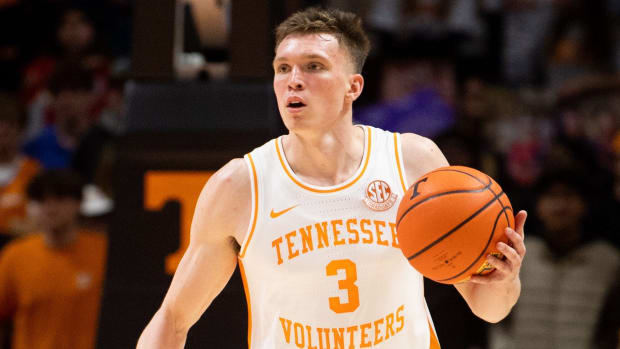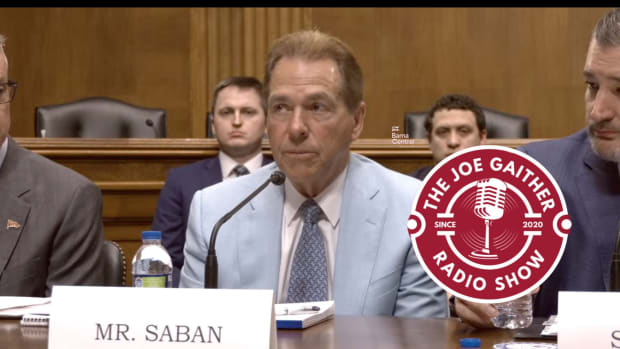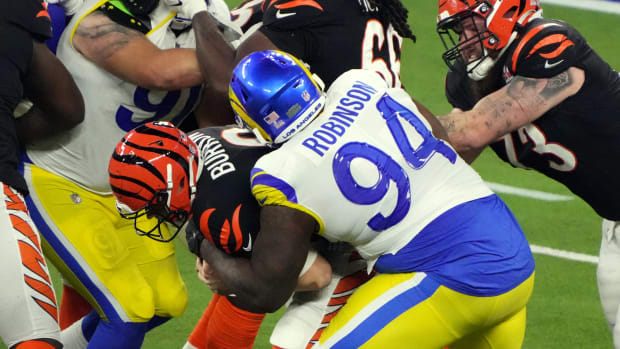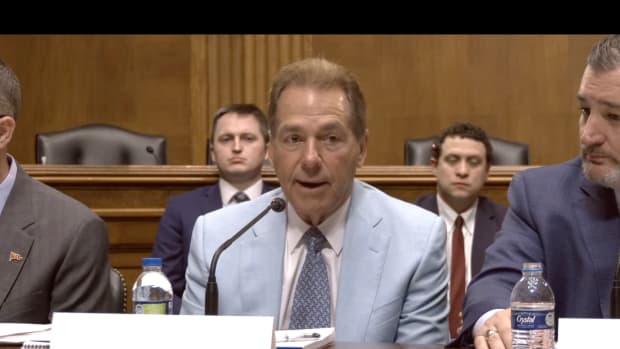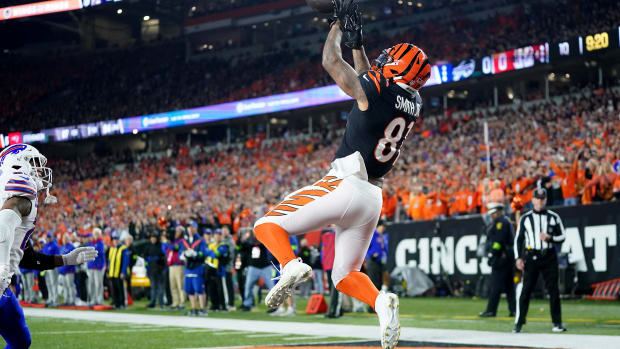Even if College Football Gets Canceled Schools, Leagues Need to be More Forthcoming With What They Know
While news continues to flow that the Power 5 conferences are moving toward canceling fall sports, with a possible final decision coming this week, one thing that's been lost in the mix is the lack of transparency on how this is all coming about.
Go back to the recent decision that might have set everything in motion for college football to be canceled this fall. The man at the epicenter was Northern Illinois athletic director Sean Frazier, who graduated from Alabama, and played football was a walk-on linebacker (1987-91)
“Right now, I feel emotionally spent,” Frazier told Sports Illustrated on Saturday. “This is one of the toughest decisions I’ve ever had to make in my life. Football has given me everything I have related to my career. It is emotional for me, as someone who loves football, to do what we had to do.
“Our president [Lisa Freeman] has given us great leadership. We had to make a decision to protect lives, but I also had to take something away from our young men. I had to step up and do what’s right, even if it hurt.”
Frazier indicated that the decision by Northern Illinois, which led to the Mid-American Conference becoming the first FBS league to postpone football to the spring, came down to one thing: not being able to protect the players.
There's no vaccine. The schools can't completely isolate everyone. The long-term effects are still being learned. Even prolific testing won't prevent future shutdowns.
In his words, "The gig is up."
“If it saves us one player’s life, one heart, one long-term health complication, it’s worth it,” Frazier told SI's Pat Forde. “I’m not a doctor. I’m a former football player and coach, and I’m in charge of safeguarding our kids. I’m doing everything I can in that regard.”
This was from someone who had heard all the evidence, knew all the numbers and thought even in July that playing in this fall was still possible. It should also be noted that Freeman's area of study was in medicine (advanced degrees in biology, physiology and veterinary medicine from Cornell, along with a Ph.D. in pharmacology from Ohio —later working as a postdoctoral fellow and research scientist).
Most people have an opinion about what they want to see happen ... correction, everyone wants there to be a college football season, but very few are able to make an accurate assessment because they don't have a snapshot of the total picture.
Do we know how many football players have tested positive for the coronavirus since workouts began in July? No.
Do we know on the conference level how many have recovered? No.
Do we know if anyone one the team might be experiencing any long-term issues? Nope.
What about the other sports?
Not only has Alabama not released any information about how the testing of players has gone, the university as a whole hasn't either.
It mandated that everyone, including students, faculty and staff, had to test negative for COVID-19 before returning to campus for classes beginning Aug. 19. Should 5 percent test positive, which seems like a very realistic figure, you're talking about 2,000-plus people.
Alabama says it is is mostly mum on the subject due to the Health Insurance Portability and Accountability Act of 1996 (HIPAA), a federal law that required the creation of national standards to protect sensitive patient health information from being disclosed without the patient’s consent or knowledge.
However, HIPAA isn't clearcut and can also be used as a shield when one isn't necessary, which is why some schools have provided regular coronavirus updates while others use it to disclose as little as possible. It's also hard to see how collective numbers could impede patient confidentiality.
Nick Saban finally spoke out to ESPN on Monday ("I know I'll be criticized no matter what I say," which is true), saying the football program was a 2 percent positive ratio since July 4th, but he hasn't met with reporters in months.
Alabama is extremely fortunate that it has resources most football programs can only dream of someday having, and doesn't appear to be afraid to use them. It could probably protect its players as well as anyone, maybe better, and consult with the finest experts, which we have to assume has been going on.
Yet colleges are releasing so little information that trying to put the pieces together is nothing short of exhausting and frustrating. It's a big part of the reason why there are now widespread calls for players to unionize so not only can they get a seat at the table but have a better understanding of what's going on and what's at stake.
Meanwhile, there's a raging debate in the country about whether students in general should go back to school, yet a valuable source of information remains silent.
Above all else, isn't the main purpose of a school to educate?
In general, the more information disclosed, the better, especially since the pandemic is impacting every aspect of society.
So when college administrators, presidents and chancellors make those tough decisions, here's hoping they do it as openly and transparent as possible. We all deserve that.
Otherwise, the trust factor will only diminish even more, at a time when its arguably never been so important.
A major issue at heart
One of the growing concerns with coronavirus, even with young athletes, is it leading to heart issues, especially myocarditis. Inflammation of the heart muscle can lead to blood clots and even heart failure.
SI's Ross Dellenger wrote today: "The brewing heart issue is a topic on recent calls among the Power 5 conference medical task force, including commissioners and team doctors. Fear over myocarditis has reached the top level of the sport, with Big 12 commissioner Bob Bowlsby and Big Ten commissioner Kevin Warren having both privately expressed serious concern over the condition."
The same red flags are being raised in other sports. For example, there's a growing concern in the NBA about whether contracting COVID-19 could lead to health problems for players well after they depart the Disney World "bubble" campus.
Per the Los Angles Times, doctors who study athletes’ hearts, lungs and respiratory systems say it’s logical to believe that professional athletes’ ages and extreme fitness levels would allow those infected with the coronavirus to produce milder symptoms and better long-term prognosis than the hospitalized, seriously ill patients whose cases make up much of the available worldwide data.
“But we just don’t want to be cavalier and make that assumption,” said Dr. Jonathan Kim, the chief of sports cardiology at Emory University and the team cardiologist for multiple professional teams in Atlanta, including the NBA’s Hawks and NFL’s Falcons. “We’re trying to be extra careful and not have a bad outcome because all it takes is one bad outcome before there’s a lot of regret. Better to be safe and let the science guide.”
Exactly how the coronavirus endangers the heart is still being learned, but that it is didn't come as a surprise to Alabama's Director of Performance Science Dr. Matt Rhea.
He tweeted: "I eluded to it in a paper I published in 2009 about sudden cardiac death among athletes. It happens after most infections. We watch for warning signs all the time. Screening now is very good. Nothing new here."
Rhea has a point in that this isn't especially new to him, or most people who deal with sports and medicine.
But it is new to nearly everyone else, plus it seems to be especially problematic with the coronavirus due to the severity involved.
A little more perspective
If you're still trying to wrap your mind around the risk of playing contact sports through the coronavirus pandemic, consider the following:
Do you play golf?
What do you do when there's lightning in the area?
You get off the course. It's dangerous and the course officials make you stop playing, in part because it's a liability issue.
But look at the numbers.
More than 400 people are struck by lightning in the U.S. every year.
According to the National Weather Service, from 2006-13, 261 people were struck and killed by lightning in the U.S. That's it. During that time period, more people died from lightning while fishing.
Per the U.S.National Oceanic and Atmospheric Association, only five percent of all lightning deaths and injuries in the U.S. happen on golf courses.
But you stop playing, right? It's lightning, something you don't take chances with, and you especially don't want to with kids.
Through Sunday, there had been more than 5.05 million confirmed coronavirus deaths, and 162,000-plus deaths.
Whom do you trust?
It doesn't help that we're also dealing with all these issues during a time in which there's mass confusion over even basic things. Just saying "Wear a mask" wasn't good enough for a lot of people, even after shutdowns and months of confirmed cases and deaths.
The No. 1 question I get from people about the media side of it is "I don't know whom to trust."
A quick, two-pronged answer.
First, distinguish between anything that is opinion-based and straight reporting. It's the difference between, say, the New York Times Op/Ed page, which can be very one-sided, and the reporting, which is generally considering outstanding.
The same is especially true of TV. Attorneys for a prominent personality recently argued in court that what their client said on air wasn't always factual and that the viewers didn't expect the truth.
Call me old fashioned, but that's what journalism is supposed to be about, the search for the truth.
Second, the most objective, opinion-free reporting you'll see begins with the wire services, either The Associated Press or Reuters.
Here's a good one to start with: Health officials are quitting or getting fired amid outbreak
Did you notice?
• Washington State’s Dallas Hobbs created the graphic calling for a players’ union in just 20 minutes
• Collin Morikawa won his first major at just 23 and has a chance to become the next face of the PGA Tour.
• Devin Booker is enjoying a breakout performance in the NBA bubble.
• The Indians sent home pitcher Zach Plesac for leaving the team hotel in Chicago to go out with friends.
• Cardinals employees infected during the team’s coronavirus outbreak have had to visit the emergency room, manager Mike Shildt says.
Christopher Walsh's notes column All Things CW regularly appears on BamaCentral

